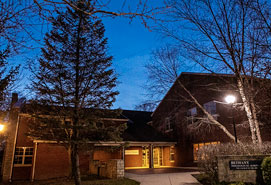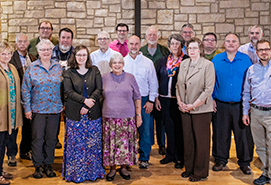Consider your call to pursue theological education.
Whether you are interested in ordained ministry, religious scholarship, lay leadership, or spiritual seeking, explore our academic opportunities.
Admissions
Bethany offers a sacred community, thoughtful faculty, and a mission beyond maintenance that takes you out of the pew and into a world in need. Below, learn more about how you can contribute to the church and the world.
- Admissions
- Apply now
- Tuition and fees
- Financial aid
- Campus visit
- Request information from Admissions
Academic Programs
Choose from three graduate degrees and a variety of certificates with local and distance-learning options. No matter where you attend class, we are always learning in community.
- Master of divinity (MDiv)
- Master of arts (MA)
- Master of Arts: Theopoetics and Writing (MATW)
- Graduate certificates
- Course schedules
- Distance education
- Academic Catalog
About Bethany
At Bethany, we empower leaders of faith through the integration of wisdom, theology, and the arts that point us towards just peace, curious intellect, and wild hope. Our teaching flows from our unique Anabaptist-Pietist heritage and tradition known as the Church of the Brethren. The Church of the Brethren offers a unique blend of practicality and spirituality grounded in service and simple living, reconciliation and peacemaking, scripture and community. It is through this lens that we strive to see the world flourish.
- About Bethany
- Bethany’s mission and vision
- Accreditation
- Faculty and staff directory
- Educational partnerships
Student Life and Community
We understand that education involves the whole person. Who becomes your community? Where do you work and play, eat and sleep? What amenities does the campus offer? Explore these links to learn more about what to expect.
- Student Handbook
- Ethical Conduct Policy
- Lodging for intensive classes
- Maps and directions
- Richmond area highlights
Crime Statistics
In accordance with the Jeanne Clery Disclosure of Campus Security Policy and Campus Crime Statistics Act (20 USC § 1092(f)), formally known as the Campus Security Act, the federal law requires all U.S. institutions of higher education to disclose information about crime on and around their campuses. The Clery Act is enforced by the U.S. Department of Education. The full text of the Clery Act can be found here (part f).
- Annual Security and Fire Safety Report– copies available upon request
The 2019 Annual Security and Fire Safety Report includes specific security and safety related policies, as well as statistics for criminal and hate offenses, arrests, disciplinary actions and fires for calendar years 2016-2018. - Earlham College Public Safety crime statistics
The daily crime log for Earlham College and Bethany Seminary is maintained in the Department of Public Safety. The crime log consists of the most recent sixty-day period. Any requests to view logs older than the recent sixty-day period must be made available to the Department of Public Safety office within two business days. The business hours for the Department of Public Safety are Monday-Friday, 8:00 a.m.-5:00 p.m.
Other Resources
OPE Campus Security Statistics Search Page – Simply enter “Bethany Theological Seminary” in the field “Name of Institution” and click the Search button.
U.S. Department of Education — Campus Security
U.S. Department of Education — Office of Postsecondary Education
Important Amendments and Dates
In 1982, the Clery Act was amended. The 1982 amendments added a requirement that institutions must extend certain basic rights to victims of sexual violence.
The 1998 amendments officially named the law in memory of Jeanne Clery.
Amendments in 2008 added provisions dealing with registered sex offender notification and campus emergency response procedures. The 2008 amendments also added a provision to protect crime victims, “whistleblowers”, and other forms of retaliation.
Clery Act Requirements
- All institutions of higher education must publish an Annual Security Report (ASR) by October 1 of each year.
- Institutions of higher education must maintain a daily crime log in hard copy or electronic format and available to the public during regular business hours.
- Disclose crime statistics for incidents that occur on campus, in unobstructed public areas immediately adjacent to or running through campus, and at certain non-campus facilities
- Issue timely warnings about Clery Act crimes, which pose a serious or ongoing threat to students and employees
- Devise an emergency response, notification, and testing policy
- Compile and report fire data to the federal government and publish an annual fire safety report
- Enact policies and procedures to handle reports of missing students








 Green Circle: Bethany invests in 100% renewable energy.
Green Circle: Bethany invests in 100% renewable energy.